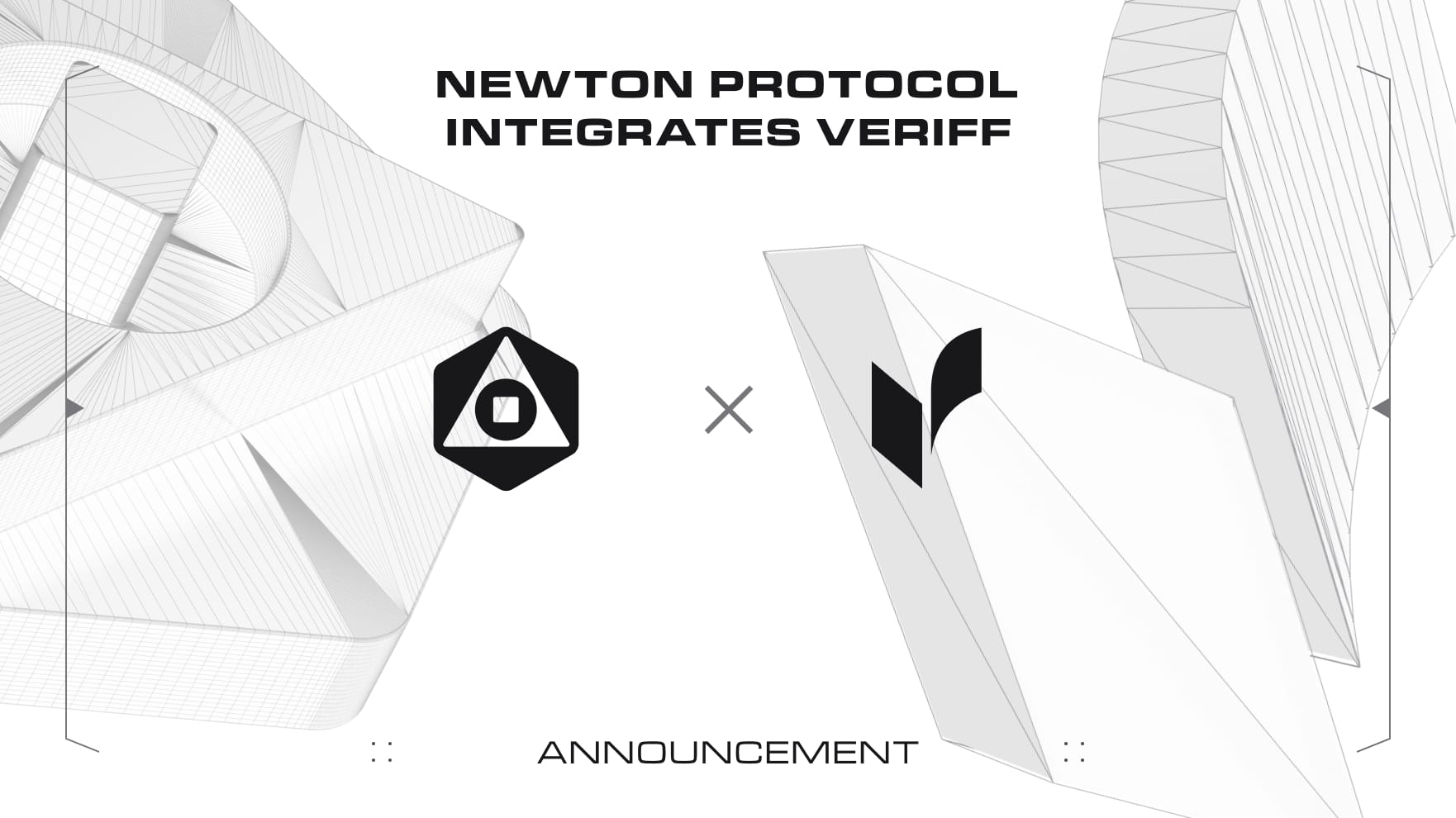Newton Protocol Launches Veriff Data Oracle to Bring KYC and Identity Verification Onchain

Most KYC, AML and fraud checks still happen offchain, sometimes manually, and inside centralized systems that cannot prove compliance. As stablecoins, RWAs and high-value transactions increasingly move onchain and become more automated, developers need identity and residency checks that are enforceable pre-transaction.
Today, we’re introducing the Veriff Data Oracle, an open-source integration built for Newton Protocol that brings Veriff’s Proof of Address verification into programmable policy enforcement.
Bringing Veriff Data into Newton Protocol
The Veriff Data Oracle connects Veriff’s Proof of Address API with Newton Protocol’s decentralized policy engine so developers can enforce jurisdiction and residency rules before a transaction executes.
With this template, a policy can require that a user has passed a verified Proof of Address check before minting, transferring, or accessing a product.
For example:
- A stablecoin issuer can require that a user’s verified address is within an approved jurisdiction before issuing tokens.
- An RWA platform can restrict participation to investors verified as residing in eligible regions.
- A cross-border payments app can validate that both sender and receiver are within compliant regions prior to settlement.
Each evaluation runs off the execution chain through Newton Protocol’s decentralized operators, with only a pass/fail attestation anchored onchain. Sensitive identity data stays offchain and is processed in privacy-preserving environments such as TEEs, ensuring compliance without exposing personal information.
Example Use Cases and Future Veriff Data Integrations
While this policy template focuses on Proof of Address verification, Veriff offers a suite of additional verification and fraud prevention APIs that developers can integrate with Newton Protocol to build more advanced compliance policies.
Identity Verification
- Identity & Document Verification: Require verified government-issued ID before enabling account creation or asset transfers.
- Database Verification: Cross-check user identity against national registries or compliance databases for regulated DeFi platforms.
- AML Screening: Automatically block interactions from users flagged by AML databases or watchlists.
- Age Validation: Restrict access to specific dApps or token categories based on verified age (e.g., age-gated DeFi experiences or gaming).
Biometric Verification
- Biometric Authentication: Verify that a user or AI agent matches a verified identity before signing or executing onchain transactions.
- Age Estimation: Add guardrails for user-facing applications that require age-appropriate access, such as tokenized gaming, gambling, or content platforms.
Fraud Prevention
- Fraud Protect: Block high-risk or flagged identities from initiating smart contract interactions.
- Fraud Intelligence: Feed Veriff’s risk-scoring data into Newton Protocol policies to adaptively require additional verification for suspicious activity.
By combining these data products with Newton Protocol’s programmable policy engine, developers can create dynamic, verifiable KYC and fraud-prevention logic that applies consistently across contracts, networks and user interfaces — without storing or revealing sensitive personal data onchain.
Why Newton Protocol Is Different
Traditional KYC systems rely on centralized platforms that cannot produce cryptographic proof of enforcement. Other onchain solutions hardcode rules directly into smart contracts, making policies rigid and difficult to update.
Newton Protocol separates policy logic from execution, enabling identity and compliance rules that are:
- Modular: define once and apply across multiple contracts or chains
- Composable: combine Veriff data with sanctions lists, risk scores or APY data for richer logic
- Updatable: adjust rules as regulations or data sources evolve without redeploying contracts
- Verifiable: every evaluation produces a cryptographic attestation visible on Newton Explorer
- Credibly neutral: enforced by a decentralized operator network secured by EigenLayer restaking
This enables programmable, pre-transaction KYC and fraud prevention without leaking sensitive data relying on centralized parties.
Get Started
Developers can now use the Veriff Data Oracle to enforce Proof of Address verification through Newton Protocol.
Head to the Developer Docs to learn how to integrate Veriff data into Newton Protocol policies.
With Newton Protocol, developers can mix and match data sources from sanctions screening, vault yield data and more to build programmable compliance that meets business and regulatory requirements.
About Veriff
Veriff is a global leader in identity verification, providing secure KYC, AML and biometric verification tools for fintechs, crypto apps and enterprises.
Veriff’s AI-powered platform offers Proof of Address, Identity Verification, Biometric Authentication and Fraud Intelligence to help companies meet global regulatory and security standards.
About Newton Protocol
Newton Protocol is a decentralized policy engine that transforms business and compliance logic into programmable policies. Developers can define, verify and enforce policies that enable real-time, privacy-preserving compliance and guardrails for RWAs, stablecoins, DeFi and AI systems.

